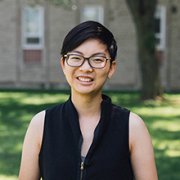
About Xenia Chan
I am a student at Tyndale Seminary, currently pursuing a M.Div. in Biblical Studies and Church in the City. Prior to my studies at Tyndale, I worked as an investigative reporter in East Asia, as a campus minister in Vancouver and Montreal, and in youth ministry among diaspora churches in the GTA. I completed my first degree in Political Science and History at the University of Ottawa. I am also the TSSA Council President for 2019-2020. In my spare time, I enjoy writing poetry and cheering on Arsenal F.C.
What are you studying at Tyndale and what year are you in?
I am in the Master of Divinity program, majoring in Biblical Studies with a concentration in Church in the City. In Fall 2019, I will be entering my third year. My main academic interests at the moment are the Old Testament (particularly the book of Jeremiah) and exploring what contextualization of the gospel for the post-Christendom era might look like.
What led you to Tyndale?
Working in campus ministry, I had many questions: how does the parachurch and the institutional church fit together? How can I engage my global South students with a gospel they can understand and isn’t dominated by a Western narrative? What does it mean to be a Christian in Canada? These were the questions that prompted me to consider seminary, and the call to seminary became increasingly clear in prayer and in conversations with friends, family, and mentors.
What do you hope to do with your degree?
As I near the latter end of my degree, I am discerning what my next steps are. I feel equally called to church-planting and pursuing doctoral work. Mostly, my hope is that what I learn here will inform my ministry–however that might look like–in the future.
What’s your favourite thing about studying here?
I love that my studies draw me closer to God and His heart for His people and creation. A big part of this is the people on this campus: the Spirit moves within the community–informal conversations, over meals, in the classroom–such that transformation happens, especially in places of deep vulnerability. It never ceases to amaze me how many ways Jesus is constantly speaking to me: in the classroom, in conversations, and even (maybe especially!) in my assignments. Oh, and the books are lovely too; I am always maxing out my library card space!
Why is Christian higher education important?
Christian higher education is formational; this time spent in seminary is meant to shape and form the student and their understanding of the Kingdom of God. As people called to minister to the church, it is imperative that we understand our histories, our traditions, our cultures, and to be able to be deeply (theologically) reflective, so that we might understand what God is doing in our world and to be able to partner with Him. Whatever the student experiences in this formational period will also go on to shape their leadership and thus the life of the church.
What does 125 years of Tyndale history mean to you?
History tells the story of God’s faithfulness to His people, and the response of people to said faithfulness. Of particular note to me is how interdenominational Tyndale was from the beginning, and how the school has stuck by its interdenominational nature whilst giving space for each denomination’s distinctives. While history tells us where we came from, it also is a reminder to not settle, but to be ever mindful of where God might be leading us next. I think that Tyndale’s longevity speaks to its adaptivity, hospitality, and creativity, and it is my hope that Tyndale will remain so, especially as we enter the post-Christendom era.